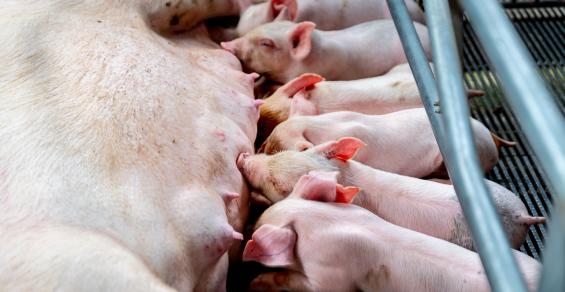Ag accelerator invests in projects designed to increase pigs per litter.
New technology continues to make its way into the swine barn. One University of Missouri researcher is looking to an artificial intelligence system to detect sows in heat; another is focusing on extending the life of boar semen.
Both projects are funded by MU’s College of Agriculture, Food and Natural Resources through the CAFNR Ag-celerator for Agricultural Technologies (CAAT) program, whose goal is to speed up innovations from concept into the marketplace.
AI for heat detection
Jianfeng Zhou, MU assistant professor in plant science and technology, was awarded $15,000 for his project, “Smart Sow Estrus Detection System Using Artificial Intelligence (AI) Camera System.”
Zhou says he and his team will use the grant for future tests and validate their AI-enabled robotic sow estrus detection system in research and commercial sow farms. They are using the funding to build a second-generation prototype that has more advanced AI algorithms and an improved robotic platform to operate in swine farms.
“This award will allow us to collect more data at a commercial setup and fine-tune the technology to get it out to sow farmers,” Zhou says. “We expect partnership with major pork-producing companies to fully commercialize the product.”
This project has a lot of impact on Missourians and beyond, he says, as labor issues are hurting the agriculture market in Missouri and globally. Sow farmers are facing challenges in hiring sufficient skilled workers.
“Emerging technologies, including advanced sensors, robotics and AI, are transforming traditional agriculture to smart agriculture that is more efficient,” Zhou says. “The success of this project is expected to reduce the labor needed in sow estrus detection by 50% by providing a robotic system. We also expect the data-driven decisions to optimize management, improve sow reproduction and increase profit for sow farmers.”
The innovation has already been selected by the MU Technology Advancement Office as a potential innovation to commercialize. A provisional patent has been filed.
“Receiving this funding means a lot to our research program,” Zhou says. “It allows us to continue to improve our innovation. Without the funding, we can hardly scale up our experiments and validate the innovation in a large farm setup.
“Secondly, seed funding allows us to acquire more data to apply for large funding from external agencies. In addition, this funding gives us more confidence and encouragement by CAFNR to work on such translational research projects.”
Viable semen
Peter Sutovsky, MU professor in the Division of Animal Sciences, was awarded $49,945 for his project, “Proprietary Compositions and Additives for Boar Semen Preservation.”
Sutovsky and his team will test specific sperm-cell-protecting additives to boar semen extenders used to prepare sperm doses for artificial insemination. Artificial insemination is the dominant reproductive management in swine as well as dairy cattle. This technology will help increase profitability and reduce the environmental footprint of swine operations in Missouri and beyond.
“Better semen extenders with more viable sperm cells yield better pregnancy rates and larger litter sizes,” Sutovsky says. “It also requires fewer laborious re-inseminations to be done at production farms and fewer adult boars to be kept in boar studs.”
Currently, there are 60,000 pork producers in the United States supporting 550,000 jobs and marketing 15 million hogs per year, Sutovsky says. Higher fertility in hogs can achieve just one extra piglet per litter, which could bring an estimated $135 million annually to producers.
“We are very grateful for this award, and we appreciate the support we have been receiving from CAFNR,” Sutovsky says. “The CAAT initiative is a very worthy undertaking that will no doubt reinvigorate our faculty and associated researchers working on potentially marketable research.”
CAAT is an annual competition. For more information about the grant funding, visit CAFNR online
Source: The University of Missouri College of Agriculture, Food and Natural Sources is solely responsible for the information provided and is wholly owned by the source. Informa Business Media and all its subsidiaries are not responsible for any of the content contained in this information asset.




